Early Childhood Education
Table of Contents
The Early Childhood Education Associate of Science Degree program at University of Hawaii Maui College is accredited by the Commission on the Accreditation of Early Childhood Higher Education Programs of the National Association for the Education of Young Children, www.naeyc.org. The accreditation term runs from October 2015 through July 2022.
Translate this page:


Conceptual Framework
Conceptual Framework – a document that describes the program
Approved June 2021 by Early Childhood Education Advisory Committee
UHMC’s Early Childhood Education Associate Degree program prepares students to work effectively with young children and their families. Ten courses in the program are prerequisites for the UH West O’ahu online Bachelor in Social Science, ECE concentration degree.
Maui College’s ECE program reaches the Tri-Isle Maui County through the UHMC Education Centers in Hana, Lahaina, Lana’i, and Moloka’i, and through closed-circuit TV, online, hybrid, and face-to-face courses. Course offerings and modalities are planned two years ahead, in order to facilitate students’ academic planning. The program prepares students to work in various early childhood education settings – infant-toddler/Early Head Start/preschools/Head Start, family child care, and family-child interaction learning programs. Home visitors can also gain knowledge and application of child development through courses offered.
Our program philosophy about learning drives our approach to teaching.
Relationships
Students will experience...
- Positive relationships between faculty and students
- Faculty who focus first on the strengths of students
- A learning space that is safe to share and make mistakes
- Build positive communication and authentic relationships with children and families
- Meet needs of children with diverse needs and abilities with a strengths based focus
Developmentally Appropriate Practice
Students will experience...
- Learning current child development theory, with a primary focus on preparing students to work with children 0-5 years-old
- Honoring diversity of our students
- View children as capable and unique members of their families and communities
- Practice culturally responsive ways of teaching with focus on cultures in our local community
- Honor diversity of children and families
- Focus on social-emotional development, engaging activities and experiences for children
- Honor the spirit of each and every child
Teaching though play and discovery
Students will experience...
- Hands-on classroom experiences throughout courses to find that “Aha” moment that they can provide for children
- Opportunities to build understanding through their own discovery, problem-solving, and reflection on experiences in classes
- Opportunities for students to make connections between content, assignments and personal experiences
- Both independent and collective work with other students
- Support joy in the lives of children, families, and other practitioners
- Plan for and support learning through play, focusing on the process of experimentation rather than a pre-determined product
- Offer children opportunities to learn through their own experimentation, and interaction with materials and people rather than focusing on memorizing facts or mastering isolated skills.
Connections with community
Students will experience...
- Involvement in the early childhood community through Service Learning, volunteering, and field experiences
- Coursework that is constantly updated to meet Maui Nui Community needs
- Community members as guest speakers
- Opportunities to observe and work directly with children using ideas and strategies talked about in classwork
- Demonstrate best practices for children and families in Maui County and the state of Hawai‘i
- Connect families to resources that are readily available, building stronger relationships with community members they have met and learned about in classes
Teaching with intention
Students will experience...
- Courses that build on students’ prior experiences as they grow in their understanding of early childhood education
- Courses that build on learning in previous courses and expanding on themes including the educational environment, inclusion of all children, and appropriate curriculum meeting the needs of diverse children and families, with increasing complexity
- With intention, using the planning cycle of observing and assessing needs, planning to meet needs, reflecting on the success of those experiences, and determining their next action
Building professionalism
Students will experience...
- Nurturance and encouragement to find their passion in ECE
- Support in developing their individual teaching styles and philosophy within the context of professional standards and guidelines
- Use of the NAEYC Code of Ethical Conduct within the context of course content
- Advocate for children and families
- In a manner that is consistent with professional standards and guidelines in their own unique way
- In ways that are consistent with the NAEYC Code of Ethical Conduct

